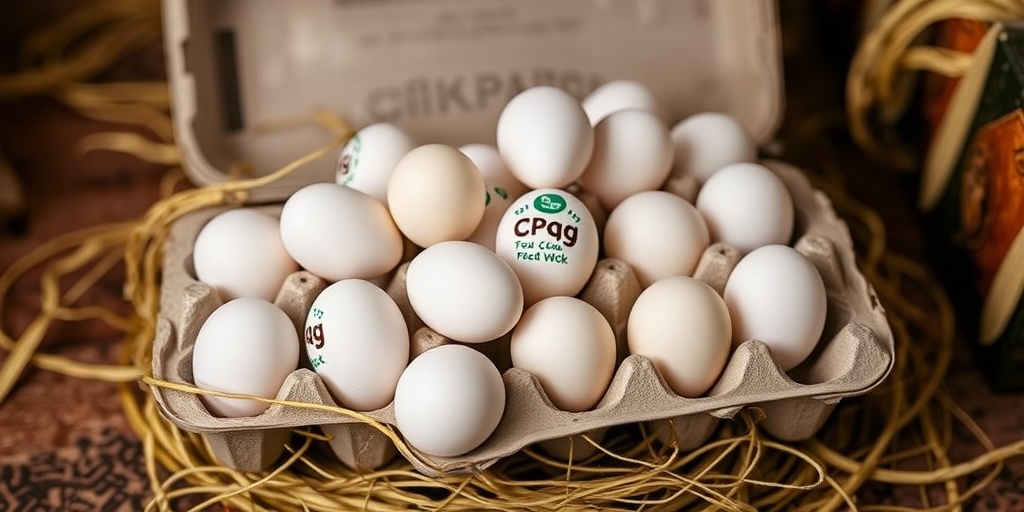Now Reading: Agri Dept Plans Egg Imports as Prices Surge
-
01
Agri Dept Plans Egg Imports as Prices Surge
Agri Dept Plans Egg Imports as Prices Surge

Record Egg Prices Prompt U.S. Government to Consider Imports
As egg prices soar to unprecedented heights, the United States government has initiated discussions about importing eggs from abroad to alleviate the crisis. Agriculture Secretary Brooke L. Rollins disclosed during a Fox News interview on Wednesday that the federal government is actively engaging with several countries to establish immediate egg imports, aiming for a short-term remedy to the current situation.
The surge in egg prices has affected many consumers, leading to increased scrutiny and concern about the factors driving these inflated costs. Rollins elaborated on a comprehensive five-pronged approach that the Agriculture Department plans to implement to tackle the ongoing challenges posed by avian influenza, more commonly known as bird flu. This approach includes a significant investment of up to $1 billion to stabilize the egg market and support affected producers.
Among the key components of this plan is a proposed allocation of $500 million aimed at enhancing biosecurity measures for egg producers. This funding is intended to fortify existing defenses against the spread of bird flu, which has severely impacted poultry populations across the country. Furthermore, the plan includes $400 million in financial assistance for farmers who have suffered losses due to affected flocks. The Agriculture Department is also budgeting $100 million specifically for research and development efforts focused on vaccines and therapeutics to combat avian influenza.
Despite the pressing need for action, it is essential to note that as of now, the Agriculture Department has not yet greenlit a vaccine for poultry. One of the primary concerns hindering vaccination efforts is the potential risk it poses to American exports. Officials worry that the introduction of a vaccination protocol could result in complications regarding the exportation of poultry products, which is a significant concern for the agricultural sector.
In addition to addressing the immediate financial challenges faced by egg producers, Rollins mentioned that the department is also exploring strategies to protect farmers from state laws that may impose strict regulations on animal welfare. She specifically pointed to a California animal welfare law that has drawn criticism and legal challenges from various business groups. This examination aims to ensure that farmers can operate without being burdened by overly prescriptive legal mandates that may hinder their operations.
While the specifics of which countries will supply the imported eggs were not disclosed by Rollins, it is notable that Canada remains the largest source of egg imports to the United States. Historically, Canadian eggs have played a crucial role in supplementing domestic supply, especially during times of shortage. Additionally, the Egg Producers Central Union in Turkey has indicated its intention to export approximately 420 million eggs to the United States, although this figure represents less than 5 percent of the total egg production in the U.S., which reached about 8.8 billion in January alone, according to the latest data from the Agriculture Department.
As consumers brace for potential further increases in egg prices, particularly in the lead-up to Easter—a period known for heightened demand—Rollins expressed cautious optimism. She conveyed that while consumers may continue to experience rising costs in the coming weeks, there is hope that prices will stabilize and "hopefully" decrease by the summer months.
The situation surrounding egg prices serves as a complex interplay of agricultural practices, market demands, and external factors such as disease outbreaks and international trade relations. Stakeholders in the agricultural sector, from producers to consumers, are closely watching the developments in the egg market, which could have longer-term implications for food prices and availability across the nation.
In conclusion, the measures being considered by the U.S. government reflect an urgent response to the challenges posed by both bird flu and rising consumer prices. The collaboration with international partners for egg imports, coupled with significant investments aimed at enhancing industry resilience, underscores the commitment to restoring stability in the market while balancing the need for food safety and producers’ welfare. As the story unfolds, it remains to be seen how effective these strategies will be in addressing one of the key staples in American households—the egg.
Stay Informed With the Latest & Most Important News
Previous Post
Next Post
-
 01New technology breakthrough has everyone talking right now
01New technology breakthrough has everyone talking right now -
 02Unbelievable life hack everyone needs to try today
02Unbelievable life hack everyone needs to try today -
 03Fascinating discovery found buried deep beneath the ocean
03Fascinating discovery found buried deep beneath the ocean -
 04Man invents genius device that solves everyday problems
04Man invents genius device that solves everyday problems -
 05Shocking discovery that changes what we know forever
05Shocking discovery that changes what we know forever -
 06Internet goes wild over celebrity’s unexpected fashion choice
06Internet goes wild over celebrity’s unexpected fashion choice -
 07Rare animal sighting stuns scientists and wildlife lovers
07Rare animal sighting stuns scientists and wildlife lovers





















